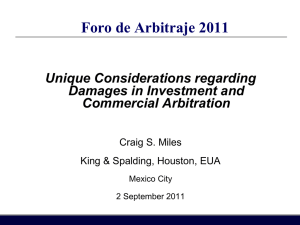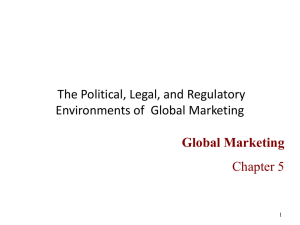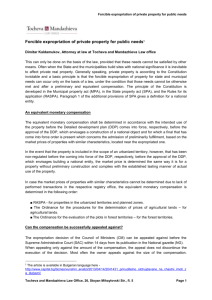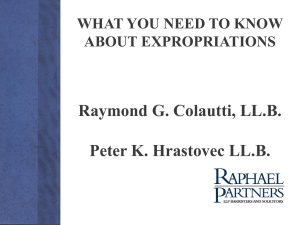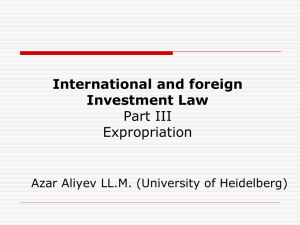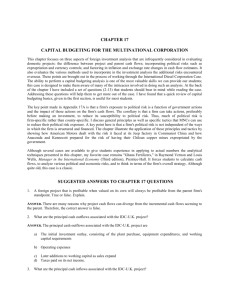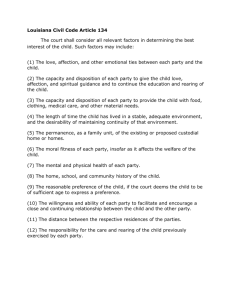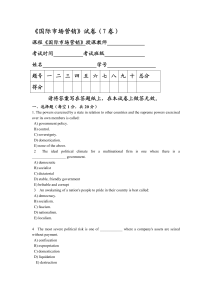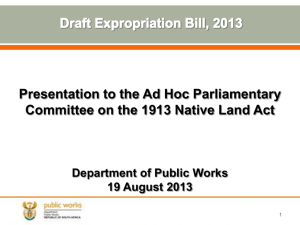OBA - The Legal Landscape Since Antrim - Scargall Owen
advertisement
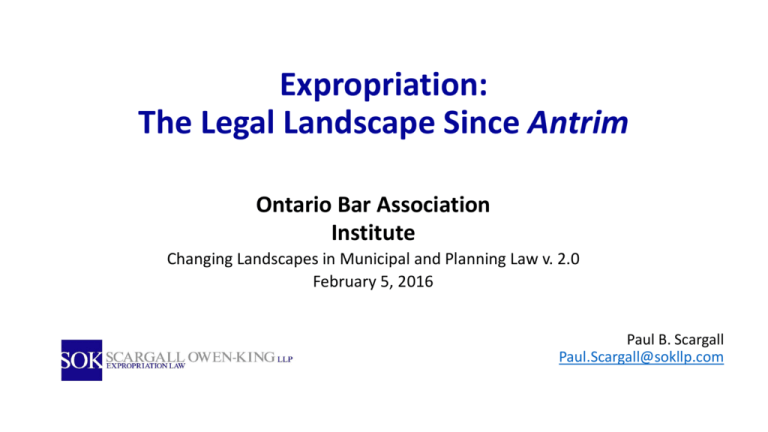
Expropriation: The Legal Landscape Since Antrim Ontario Bar Association Institute Changing Landscapes in Municipal and Planning Law v. 2.0 February 5, 2016 Paul B. Scargall Paul.Scargall@sokllp.com The Expropriation Process Municipality or other expropriating authority decides it requires private land. Discussions between the parties do not result in a negotiated purchase and expropriation is deemed necessary. The expropriating authority files a Plan of Expropriation on title to the expropriated land within three months of the approval of the Certificate of Approval of Expropriation, transferring ownership of the land to the expropriating authority. Notice of Application for Approval to Expropriate Land served upon each registered owner of the lands to be expropriated. A registered owner who receives a Notice of Application for Approval to Expropriate Land may request a Hearing of Necessity within 30 days of receiving the Notice. Inquiry Officer provides non-binding recommendations. The expropriating authority must serve a registered owner with a Notice of Expropriation, Notice of Election and Notice of Possession, within 30 days of registration of the plan. The expropriating authority may take possession at least three months after serving the Notice of Possession. After considering the reasons from the Hearing of Necessity (if held), the approving authority prepares a Certificate of Approval of Expropriation. Within three months after filing the Plan of Expropriation, the expropriating authority must serve an Offer of Compensation on the registered owner, which is based upon an accompanying appraisal report. The owner may accept the offer without prejudice to the right to claim further compensation under the legislation. Compensation: Making the Owner "Whole" Market Value Disturbance Damages Injurious Affection Relocation Related Expenses • damages for the amount that the land might be expected to realize if sold in the open market by a willing seller to a willing buyer. • damages that arise as a result of the “natural and reasonable consequences of the expropriation,” including: business losses; relocation expenses; construction damages and impacts; and loss of improvements. • damages where a statutory authority acquires part of the owner’s land which results in a reduction in market value of the remaining land; OR where no land is taken but the expropriation or related works nevertheless results in a reduction in the market value of the land and/or personal or business losses. • damages intended to compensate owners who experience difficulty in finding a replacement property with the same or similar attributes as the expropriated property. Antrim Truck Centre Ltd. v. Ontario (Transportation) 2013 SCC 13, [2013]1 S.C.R. 594 BACKGROUND: • A claim for injurious affection arising from the Ontario Ministry of Transportation’s construction of a new Highway 417 near Ottawa, which rerouting traffic away from Highway 17 and the owner’s truck stop, effectively putting the operation out of business at its existing location. DECISION: • The Supreme Court uninanimously decided that the truck stop owners were entitled to damages for injurious affection on the basis that the statutory requirements to recover damages for injurious affection where no land is taken were met: (i) the damage resulted from action taken under statutory authority; (ii) the action would give rise to liability but for the statutory authority; and (iii) the damage resulted from the construction and not the use of the works. • The Ministry’s interference with the owner’s use and enjoyment of land met the test for private nuisance as it was both substantial and unreasonable. Vincorp Financial Ltd. v. Oxford (County) 2014 ONCA 876, 113 L.C.R. 77 Valid public purpose Powers of a municipal corporation BACKGROUND: • An action brought by a landowner and mortgagee of a shopping mall expropriated by the County of Oxford and later transferred to Toyota Motor Manufacturing North America Inc. to build a car manufacturing plant. • The owners claimed that the County’s expropriation and subsequent sale of the lands to Toyota: (i) conferred a “bonus” on the manufacturer contrary to the provisions of section 106 of the Municipal Act; (ii) was illegal as it had been tainted by the concurrent agreement to sell the lands at the expropriated value; and (iii) amounted to trespass for damages for the difference in value. DECISION: • The Court deferred to the trial judge’s decision finding that a “bonus” had not been granted, there had been two separate transactions, and the transfer of the lands to Toyota was for a valid municipal purpose stating: …a compelling valid purpose (promotion of economic development), drove Oxford's decision to expropriate the mall lands and sell this land to Toyota for the expropriation price. The fact that the mall lands were transferred to Toyota for the expropriation price does not change the validity of the expropriation power that was exercised. [emphasis added](para. 11) R. Jordan Greenhouses Ltd. v. Grimsby (Town) [2015] O.M.B.D. No. 95, 2015 CarswellOnt 2187 Compensation Injurious affection where no land taken BACKGROUND: • Owner of greenhouse and garden centre brought claim for injurious affection resulting from road and sewer works undertaken by the Town of Grimsby. The Town’s works within the right-of-way of the adjacent roadway impeded access to the retail business. DECISION: • Applying the reasoning in Antrim, the Ontario Municipal Board determined that the owner had been injuriously affected by the Town’s works, which substantially and unreasonably interfered with the owner’s use and enjoyment of the lands. • This was evidenced by the fact that the Town had initiated a sewer construction program that commenced in the spring months of the year, which was the busiest season for the greenhouse. The business depended on vehicular traffic and was significantly impacted by the lengthy construction and closure of at least one lane of the entire road for two weeks. Dartmouth Crossing Ltd., Re 2015 NSUARB 48, 2015 CarswellNS 204 Injurious affection Limitations period Particulars BACKGROUND: The Halifax Regional Municipality expropriated several easements for sewer construction in the area of Dartmouth Crossing and Burnside Industrial Park. The expropriations eliminated a strip of trees, which functioned as a buffer between the adjoining highway and a planned residential development. The owner’s claim for injurious affection was denied by the Municipality on the basis that the owner had failed to provide “particulars” within the one-year limitation period set out in section 31(1) of the Nova Scotia Expropriation Act, R.S.N.S. 1989, c. 156: Procedure for claim for injurious affection 31 (1) Subject to subsection (2), a claim for compensation for injurious affection shall be made by the person suffering the damage or loss in writing with particulars of the claim within one year after the damage was sustained or after it became known to him, and, if not so made, the right to compensation is forever barred. [emphasis added]. DECISION: The Board stated that: …having reviewed the legislation and case law (most especially from the Ontario Superior Court of Justice and the Supreme Court of Canada), [the Board]concludes that s. 31(1), properly interpreted, requires only that a claimant disclose to the expropriating authority (in this case, HRM) sufficient information: • to inform the expropriating authority of the existence of the claim; • to inform the expropriating authority of the nature of the claim; • to allow for preservation of evidence. The Board finds, as a matter of fact and law, that DCL disclosed sufficient information to meet that standard. For greater certainty, the Board finds that DCL complied with s. 31(1) of the Act. [emphasis added] (paras. 186-187) Willies Car & Van Wash Ltd. v. Simcoe (County) 2015 CarswellOnt 7573, 115 L.C.R. 39 (OMB) BACKGROUND: Injurious affection Limitation period No land taken • A claim for injurious affection brought by the owner of a car wash located near County Road 10 in Alliston, an access road which served as the principle entrance to the area Honda Automotive Manufacturing Plant. The access road was eventually rerouted and conveyed to Honda. • The owner alleged that the realignment of County Road 10 led to a significant decrease in traffic passing by the car wash, which in turn decreased business. The County responded by arguing that the claim was statute barred because it had not been raised within the one-year limitation period. DECISION: • The Board determined that it would consider the claim even though it was outside the one-year limitation period. But ultimately found that the alleged losses were not the result of the construction of the works or rerouting of the road. Rather the decline in the number of car washes was more likely caused by other factors such as economic decline and reduced consumer spending. Erbsville Road Development Inc. v. Waterloo Region District School Board 2015 ONSC 5216, 260 ACWS (3d) 95 (Ont. Div. Ct.). Interest on compensation BACKGROUND: • The case involved an appeal to the Ontario Divisional Court by the Waterloo Regional District School Board of a decision awarding the owner statutory interest on compensation accruing from the date a subdivision plan received draft approval designating the property as a future school site. The draft approval predated the expropriation of the lands by approximately six and a half years. DECISION: • The Divisional Court succinctly summarized its findings stating that: In my view, the board member applied the correct test for the commencement date for interest under s. 33(1). He made no legal error in awarding interest for a period of time preceding the expropriation. His finding that productive use of the land ceased at the time Plan 30T-97017 received draft approval was reasonable. His failure to refer to other uses to which Block 38 was put after the date did not affect the result. His decision to dismiss the School Board’s request to deny interest due to delay was also reasonable. [emphasis added](para. 89). THANK YOU For more information contact: Paul B. Scargall Paul.Scargall@sokllp.com SCARGALL OWEN-KING LLP 250 Yonge Street, Suite 2200, P. O. Box 4, Toronto, Ontario M5B 2L7 T 416 869 2202 F 416 869 2201 www.sokllp.com
